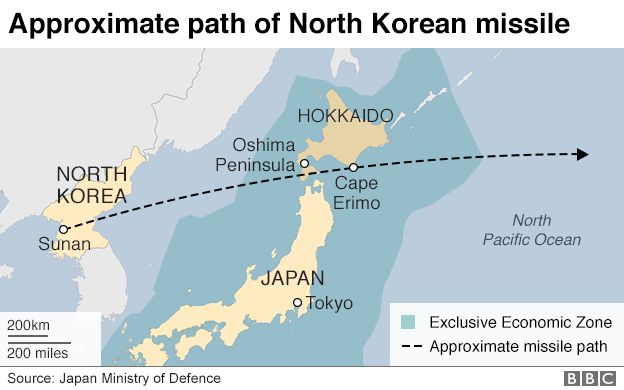
Last August, North Korea launched what is believed to be a Hwasong-12 military grade ballistic missile towards Japan. This aggressive act towards the US ally is thought to be the latest move in the tit for tat between North Korea and the United States. There is the belief that North Korea is close to being able to place nuclear weapons on its ballistic missile systems, and has already demonstrated that it is capable of reaching targets well beyond its own borders.
Questions come with how the region wishes to progress in the future. In addition, the strategy to achieve this progression and the often unmentioned innocents living in North Korea that are subject to the fate given to them by the response of the two biggest egos in the metaphorical room.
Since the end of the Korean War in the 1950s there has been a cease-fire, but no actual peace agreement was achieved for the last few generations. This allowed North Korea and its ruling family to live and thrive by means of appeasement diplomacy. North Korea’s neighbours had to either walk softly around a large military force run by one individual, or have passively supported the regime so that it would not have to deal with the consequences of millions of North Koreans suddenly ending up with no control or leadership.
Ignoring a problem did not reduce its risk, and while North Korea was being appeased diplomatically, it slowly created its own nuclear weapons program, including semi-sophisticated missile systems to protect its ruling elite.
The risks posed by North Korea is reaching a critical stage where any leverage by the US or its allies have been spent without much definitive progress over the years trying to reduce a weapons program that will now certainly come into existence.
It is not expected that the US or its allies will want to greatly change the status quo, and there is next to no mention of the rights of those living in North Korea as regime change is mostly off the table. In this scenario, neighbours can only hope that North Korea decides they are content keeping the region hostage without a nuclear or conventional weapons strike, and hope that order does not beget chaos within North Korea with a nuclear weapons program ready to launch.
A stronger position would be to take the time to develop a truly effective Anti-Ballistic Missile system, similar to one that forms a defensive ring around Moscow, and hope that shooting down threats diffuses the calls for escalating a situation into a larger conflict. ABM diplomacy would allow US allies to regain a bit of their leverage, but still would maintain a horrific scenario where a nuclear armed and capable North Korea could set off a conflict at the whims of their leader, at the time and place of his choosing.
The end result of years of passive diplomacy over North Korea’s future nuclear threats is coming to a climax, and there are fewer and less viable options as North Korean technology approaches the reality of their spoken threats. With more small nations choosing ballistic missile diplomacy as a means to an end, the ABM diplomacy route may be the best/worst option in maintaining a status quo in diplomacy that has led to the current crisis, and will likely lead to many others.